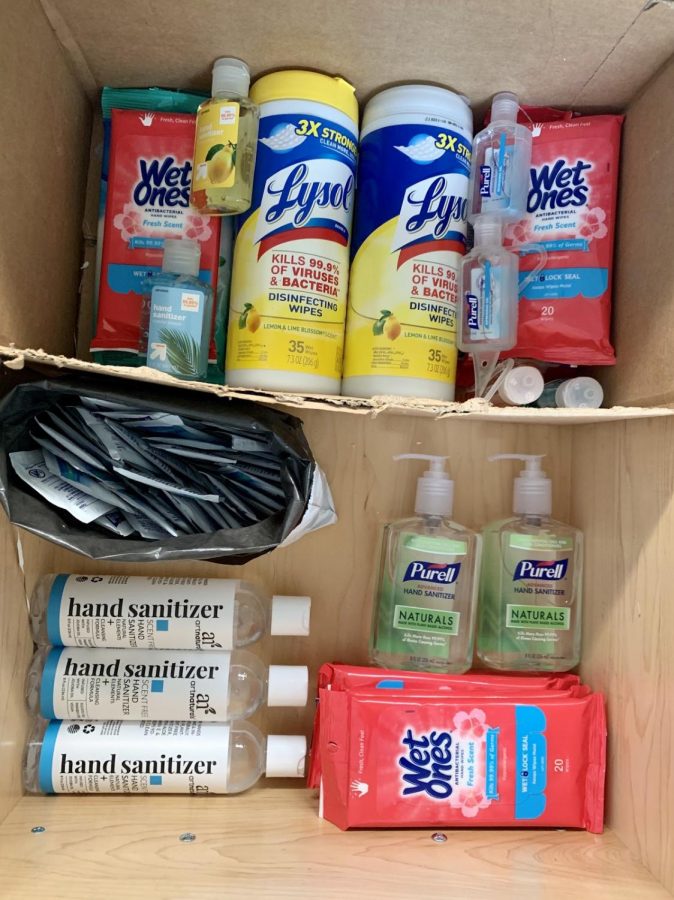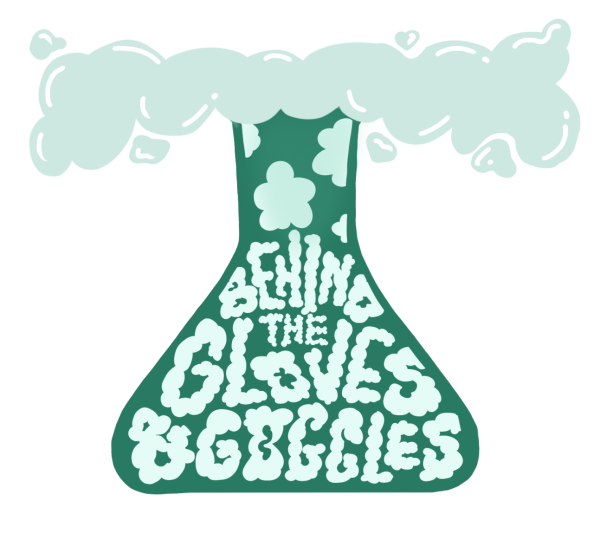While Coronavirus Cases Multiply, Plastic Usage Increases
Families collect hand sanitizer, disinfecting wipes and cleaning supplies in attempts to prevent the spread of COVID-19. Staff photo: Louisa Sonsini.
April 16, 2020
The coronavirus is currently being publicized twenty-four-seven across multiple media platforms worldwide, and new statistics are constantly broadcasted. The rapid spread of this disease has made a large impact on the daily life of many; however, what about coronavirus’s impact on the world from a sustainability standpoint?
Ever since the coronavirus outbreak, shelves previously stocked with cleaning supplies and sanitation tools are bone dry. Meanwhile, the demand for Purell and wipes continues to rise online according to a Wall Street Journal article. The article further states that to properly execute sterile practices recommended by the Centers for Disease Control and Prevention (CDC), equipment like hand sanitizer is necessary.
Disinfectant products, like hand sanitizer, wipes and sterilizing spray, are all similar in the sense that they are commonly held in plastic containers. Consequently, the swelling desire for this equipment has culminated in a global surge of plastic usage. According to a CBS News article, the demand for hand sanitizers has increased by 1,400% between December and January this year.
The apparent upward trend in plastic consumption has had a negative impact on the sustainable practices of Bay Area citizens and Menlo School’s community. Members of Menlo’s environmental club, The Climate Coalition, have varying responses to this pattern. “I’m in complete support of decreasing […] the spread of the virus, and switching to plastic is a form of doing so. However, I’m conflicted since we’re putting the lives of humans over that of sea creatures,” senior Janina Troper, the club’s leader, said.
“I think that the increased use of disposable items is really unfortunate, but in some scenarios necessary,” senior Nils Forstall, leader of the Education Branch in the Climate Coalition, said.
When the spread of the coronavirus had just begun in Santa Clara County, Menlo quickly responded to the threat of the virus by issuing various changes throughout the school. One significant change that the school mandated was resorting to plastic utensils in the cafeteria rather than the usual metal ones, in attempts to prevent cross-contamination. Nonetheless, the reusable plates were not replaced and continued to be used by students and faculty in the cafeteria.
“I think it makes no sense that the Menlo cafeteria used reusable plates, and then went on to say that we needed to transition away from metal utensils and cups due to contamination,” Troper said. “In addition, I think there could have been a better way of communicating which bins were trash and which were compost at the dish drop.”
Climate Coalition member senior Marilyn Serrano also expresses her disappointment in the unsustainable setbacks the coronavirus has presented: “We had so much progress done in terms of cut back on plastic usage […] at school, and now because of the circumstances [of the coronavirus], we’ve kind of had to rewind back to how we were before,” Serrano said.
Nevertheless, the association between plastic equipment and sterilization can be combated according to the Climate Coalition. Members of the club propose alternative, more sustainable practices that also demonstrate cleanliness. When Menlo was in session, “I brought my metal utensils and reusable water bottle to school to avoid using the plastic ones served during lunch,” Troper said.
With families hoarding everyday necessities like food and water, there is also an increase in plastic waste. Serrano provides a solution to this rising problem: “I feel like we can be both mindful of the situation, while also being mindful of the environment. I’ve been encouraging my family to [buy] single gallons of water […] instead of packs of plastic water bottles […], so we’re not using as much plastic,” she said.
Despite the current rise in plastic items like Purell and Lysol wipes, with the government issuing of the shelter-in-place rule, transportation isn’t as imminent. “The coronavirus has and will continue to significantly reduce carbon emissions since air travel is greatly reduced and a large portion of commutes have been eliminated. So, the damage to our environment from increased plastic use will be more than compensated,” Forstall said.













